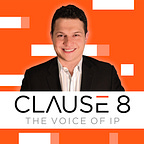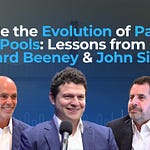What is outside counsel’s real job? How do you make patents part of a 100-year-old company’s DNA? Why did Ocean Tomo fail to become the Goldman Sachs of patents? How do you get opposing counsel to offer you a dream job?
The Renaissance Man of IP – Raymond Millien – shares these secrets on the latest episode of Clause 8. Ray previously served as Chief IP Office at Volvo and is now the CEO of the IP boutique, Harness IP. Prior to that, Ray served as the general counsel of a groundbreaking IP business, helped rebuilt the IP program of a Fortune 100 company after the Great Recession, and co-founded the PCT Law Group.
On this episode, Eli talks to Ray about how to succeed as in-house counsel and outside counsel, how to properly built a patent portfolio for a major corporation, and what it takes to succeed in the IP field.
Episode Highlights:
[01:35] From computer programming to IP: Born in Brooklyn to Haitian parents, Ray discusses how he “Forrest Gumped” his way into IP law.
[06:46] The Goldman Sachs of IP?: Ray talks about how he fell into being general counsel at Ocean Tomo, which had a vision of being the “Goldman Sachs of the IP world.”
[10:28] Jumping into public policy and out: Excursion into lobbying on IP issues after starting PCT Law Group in Washington, D.C., and jumping out to restart Goldman Sachs’ IP program
[16:58] Ignore at your own peril: How should financial services companies — which don’t produce physical products — go about building an IP portfolio?
[19:45] The challenges of management: What does a Chief IP Counsel actually do? There’s plenty of confusion and misconceptions over the job. As Ray explains, it varies from company to company.
[22:45] Be a salesperson: As the former Chief IP officer at Volvo, Ray was working for a multimillion-dollar company that was famously innovative. Ray explains what it takes to survive such a role.
[29:02] Setting a quota: Many companies set a goal for how many patents they want to file by the end of the year. Ray explains why he disagrees with this practice, even with “use it or lose it” budgets.
[34:56] Quality vs. quantity: How can a company build a respectable patent portfolio? Ray talks about how you need quantity to get to quality.
[39:48] What works and what doesn’t: Chief IP Counsel get tons of emails and messages from outside counsel every day asking to represent their company or product. Ray let us in on what caught his attention.
[42:15] Be a renaissance IP lawyer: Ray explains how he became a “renaissance” IP lawyer and how knowing a little bit about all sides of IP has helped him succeed in his career.
[44:59] What needs to change: Ray talks about how the system itself that needs to work faster.
[46:14] From opponents to colleagues: “I’ve been Forrest Gump my entire career:” Ray reveals the unusual circumstances of how he ended up working for Harness IP.
[53:03] The plague of patent law: Ray talks about what’s plaguing the U.S. patent law system now — the lack of consistency in software patent rulings in federal courts.










